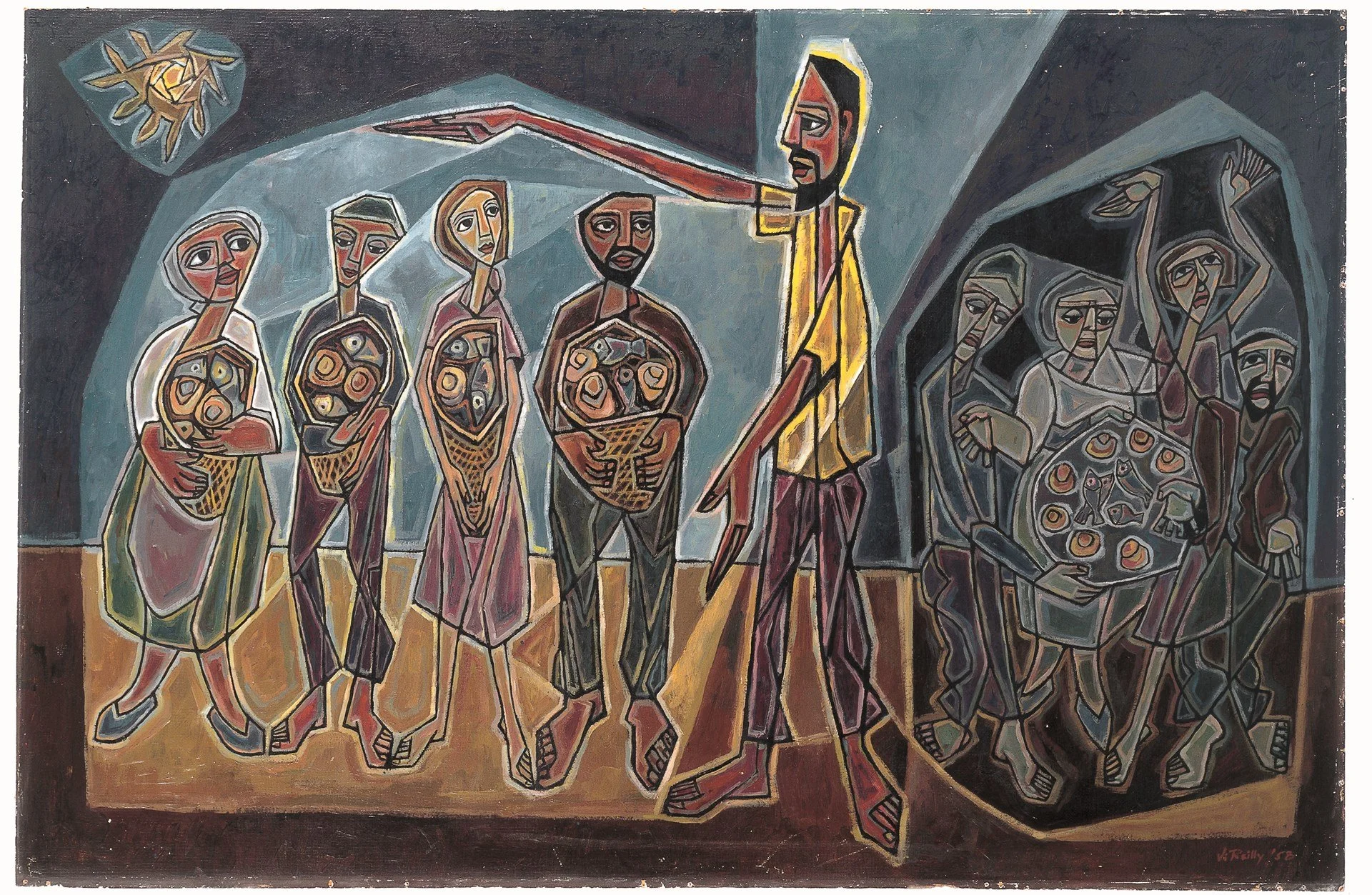What if I don’t Feel Grateful?
Matthew 14:13-20 (First Nations Version):
When the evening came, his followers said to him, “This is a deserted place, and the day is almost over. Let us send the people away to the villages in the countryside so they can find food to eat.”
Creator Sets Free (Jesus) looked around at the great crowd of people, for there were over five thousand who had gathered there. There is no need to send them away,” he said to his followers. “You feed them.”
His followers could not believe their ears! With one voice they said to him, “All we have is five pieces of fry bread and two fish!”
“Bring them to me,” he told them. Then he had all the people sit down on the grass. He took the five pieces of fry bread and two fish and held them to the sky. He looked up, gave thanks to the Great Spirit, and began to break the fry bread into smaller pieces, which he gave to his followers to give to the people. Everyone ate until they were full! When they were done, they gathered the leftovers—twelve baskets full!
—————-
The feeding of the five-thousand is on Jesus’ greatest hits album. I mean, it’s no “look at me, I’m not dead now!” but just because Easter gets all the attention doesn’t mean other miracles aren’t just as good. In my twelve years at West Hills Friends, I’ve probably read this story at least six times. Once every two years is quite an accomplishment, considering I’ve yet to read one story from the book of Obadiah.
What could possibly be fresh on the 7th reading? I have a feeling this Jesus fella was more of a poet than all these snobby intellectuals have made him up to be. These stories, his parables, and his whole life seemed layered with meaning. We keep coming back to them, finding in those layers something we had not known we needed before.
What stood out to me this time? The dude looked to the sky, while thousands upon thousands of STARVING people watched him hoist barely enough food to feed the people in this room and say, “hey, Daddy God, thank you for this” AND HE WASN’T EVEN SARCASTIC ABOUT IT. When people tell me that they don’t believe in the deity of Jesus I tell them how unlikely I or I think most humans, would be to do the things he did with a straight face.
John Reilly - The feeding of the five thousand
It takes someone with divine-like confidence in some power other than themselves to take five pieces of frybread and two fish and say “this will work great, thank you!” Because if it was Mark Pratt-Russum on stage, I’m fairly sure gratitude would be at the bottom of the deck of emotions I’d be feeling. Nervousness to the point of soiling my pants would definitely be the top card.
And this isn’t the first time he did it, and it wouldn’t the last. The night he watched one of his most trusted followers slip out of dinner with a fat bag of gold in his hands, he knew the bread in his hands would be the last food he’d ever eat. I’m thinking I might not be so into a late dinner knowing one of my best friends just slipped out the door to give me up to the authorities. But Jesus did the thing with the bread again, he gave thanks and he broke the bread up and fed his friends. Gosh darn it, if Judas had made it back before dessert he’d probably have fed him too. Stinking over-achiever.
Perhaps it does point to some kind of transcendent, divine being, who can find a way to feel something so seemingly opposite of what most of us would actually feel. OR, maybe, just maybe, the human side of Jesus didn’t feel grateful at all. Maybe in front of the five thousand, he felt just as sick to his stomach as I would have.
Let us not forget that Jesus asked God to save him from the oncoming horror of a public execution the night before it all went down. Wouldn’t it have been interesting if one of his followers would have said to him, “hey, buddy, cheer yourself up! You should be grateful you have lived as long as you have!”
But the divine side of Jesus pushed him beyond feeling, to practicing.
Perhaps one of the greatest lessons we learn in practicing how to get along with other people is when we say something with the best of intentions, but quickly see that what just came out of our mouth hit a person’s ears and made them feel completely unseen. There are lots of shortcut things we say to people, thinking it is a trusted consultation in a time of suffering, but up there with the worst of them is, “You should feel grateful that…”
I’ve rarely found a sentence starting with those five words to ever be the key to addressing another person’s suffering. Our attempts at giving another person perspective on their situation might be a wise tactic, but rarely does a suffering person feel anything but guilt at being told “Well, hey, you know, it is awfully selfish of you to be feeling sad about this…”
As a parent and a person, I am doing my best to avoid telling anyone that they shouldn’t feel what they are feeling. There are times when we may be hurting and being shamed into feeling better by being told we SHOULD feel grateful is harmful.
I am still healing from the expectation placed on me by Christian folks to forgive my father for what he did to my family in the days AFTER his affair was revealed. When someone told me “You SHOULD feel the need for forgiveness for what he did to you in your heart.” When I didn’t feel it, I suddenly felt like the person in the wrong. I didn’t feel forgiveness. Forgiveness was at the bottom of the deck. I was afraid. I was eleven years old and terrified.
I think we are continuing to do damage to ourselves when we tell ourselves we should be feeling something that we aren’t feeling. While we can feel gratitude, I think Jesus showed us gratitude as a way of acting. I have another one of Jesus’ greatest hits tattooed on my left wrist, “love your enemies.” If I were to close my eyes and think of who my enemy is, I doubt love is the first feeling that comes to mind. And yet, I think it is still possible to not feel love for my enemy while acting in love by not volleying back the harm at them. That is an act of love and tremendous bravery.
And even that might be too much for me as a 100% real human if I’m honest. And I’m not even sure God has high expectations that we will find the perfect way of acting in love or gratitude to the people or situations that have harmed us.
Perhaps the power of gratitude as an action is that it disrupts the presumed order of things. Theologian James Alison says,
James Alison
“Gratuity is when someone gives something to us without any interest attached at all when we are moved by something that is quite outside the network of relationships, friendships, economic and political ties that constitute our life. It is when something appears in our life that has no reference at all to what we feel we need or deserve, and over which we have no control, no ability to manipulate. Occasionally, we do experience hints of something like this, but mostly all of us are tied in to the rhythms of the expected, the reciprocated, the demanded, the earned, or the punished.”
Practicing gratitude as an action creates in the lives of our neighbors a holy disruption of love freely given. This disruption is a sacred thing, in my book because we are suddenly ambushed by grace, unable to squirm away from this lovely freely given by our attempts to pay someone back, or to claim ourselves unworthy of it. And the mystery of this all is that when we are the recipients of gratuity, this might be the most profound time of feeling gratitude.
I have been a part of the Christian church for the last 28 years of my life. The majority of that time has been spent attempting to put a flag down, to say, “here I am! I believe this! I have arrived!” I keep thinking that in order to put down that flag I must finally feel the right way about all of the things I should believe. I have been on a journey of releasing this way of thinking about faithfulness. I am no longer feeling the need to arrive, to plant a flag anywhere. I am feeling drawn to the work of practicing. Of practicing love. Of practicing gratitude. Of practicing being in community with all of you. There will be times when the feeling of love or gratitude feels hard to come by. My hope is that in those times the act of gratitude and love will show up for us when we need it.
Here are some queries :
When has an act of love or gratitude entered your life and caused a delightful disruption to the way you assumed things should be?
How has practicing, or acting in gratitude been different than feeling gratitude?

